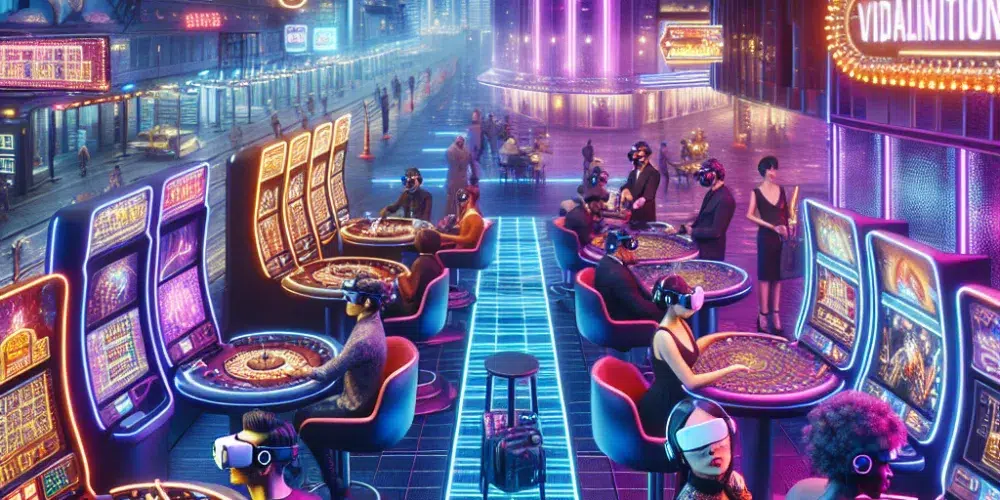The casino industry is witnessing a groundbreaking revolution with the emergence of Virtual Reality (VR) technology, dramatically transforming the gambling experience. As we progress into 2024, VR casinos are not merely a niche novelty but are becoming a substantial segment of the gaming market. This innovative leap is redefining what it means to gamble, offering a blend of realism and convenience.
The Immersive World of VR Casinos
Virtual Reality in casinos allows players to step into a fully immersive gaming environment from the comfort of their homes. With a VR headset, gamblers are transported into a three-dimensional casino where they can interact with other players and live dealers, just as they would in a physical casino. This technology is not only advancing the user experience but also broadening the scope of how traditional gambling is perceived.
Leading companies like Oculus and HTC are continually refining their VR technology, enhancing the visual fidelity and user comfort, thus making VR casinos more accessible and appealing to a wider audience. Notably, game developers are leveraging this technology to introduce a variety of games, from VR slots to immersive versions of blackjack and poker.
How VR Transforms Casino Interactions
One of the standout features of VR casinos is the level of interaction it offers. Players can read body language, engage in real-time chats, and use gestures, mimicking the interactive nuances of a real-world casino. This aspect of VR gaming not only enriches the gaming experience but also instills a layer of strategy that traditional online casinos struggle to match.
“Virtual Reality has notably changed the way we engage with gaming environments. It’s not just about gambling anymore; it’s about experiencing a new reality,” says Jonathan Rivers, a tech analyst specializing in gaming innovations. “2024 is likely to be a pivotal year as VR technology becomes more mainstream in the gambling sector.”
Economic Impact and Consumer Reception
The adoption of VR technology in casinos is also having a positive economic impact. According to a recent market analysis report, the VR gaming market size is expected to grow substantially, with a projected increase to over $40 billion by 2026. This growth is driven by both the enhancement of user experience and the increasing accessibility of VR technology.
From a consumer perspective, the feedback has been overwhelmingly positive. Gamblers appreciate the combination of the thrill of a physical casino with the convenience of online access. Regular casino-goer, Emily Thompson shares, “VR casinos have changed the game for me. The realism and the social interaction are unbeatable. It feels like being in Vegas, without actually having to travel.”
Challenges and Future Directions
However, the integration of VR into the gambling world is not without challenges. Issues related to motion sickness, the cost of VR headsets, and the need for robust internet connectivity are some of the barriers to widespread adoption. Moreover, regulatory frameworks are still catching up with this new mode of gambling, which poses a significant challenge for both providers and users.
Looking forward, the sector is ripe for further innovations. Continuous improvements in VR technology, coupled with more competitive market offerings, are expected to drive down costs and solve many current usability issues. Additionally, the possibility of integrating augmented reality (AR) with VR presents an even more exciting future for the casino industry.
Key Takeaways
– VR Casinos are transforming traditional gambling, offering an immersive experience that mimics being in a physical casino.
– Economic growth in this sector is promising, with significant market expansion projected in the coming years.
– Consumer feedback is positive, highlighting the enhanced realism and interactive features as major benefits.
– Challenges such as technology costs and regulatory issues need addressing for broader adoption.
FAQs
Q1: How real does gambling in a VR casino feel?
A1: In a VR casino, the environment is designed to be as realistic as possible, featuring detailed casino layouts, interactive dealers, and realistic slot machines and table games.
Q2: Are VR casinos safe and regulated?
A2: VR casinos adhere to the same regulatory standards as traditional online casinos. However, as this is a relatively new area, ongoing developments in regulation are expected.
Q3: Do I need to own a VR headset to participate in VR gambling?
A3: Yes, a VR headset is required to fully experience and interact within a VR casino.
Q4: Can I play all traditional casino games in VR?
A4: While not all casino games are available in VR format yet, many popular games like slots, blackjack, roulette, and poker are already accessible in VR casinos.
Virtual Reality casinos in 2024 offer a tantalizing glimpse into the future of gambling, highlighting a shift towards more immersive and interactive gaming experiences. As the technology advances and becomes more integrated into everyday life, VR casinos are set to redefine the boundaries of gaming and entertainment.

David Garato is a luminary in gaming journalism, renowned for peeling back the curtain on the gaming world with his witty and insightful commentary. A decade into weaving stories from the pixelated edges of indie games to the expansive universes of AAA titles, David’s work is a thrilling blend of analysis and adventure. When not writing, he’s live-streaming, sharing his gaming exploits with an engaged and growing audience. David doesn’t just write about games; he lives them, making him a trusted guide in the gaming community.


